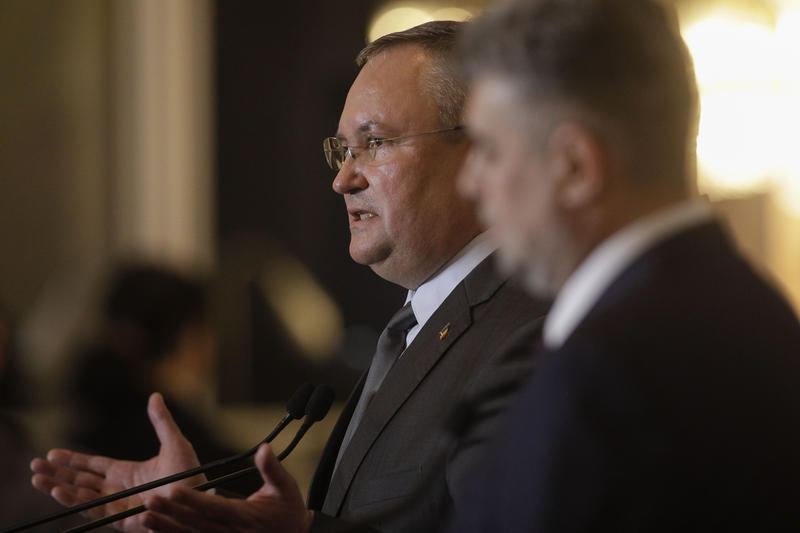The Romanian Government took responsibility on Monday for the two law drafts already announced, which focus on the cut in public spending (including salaries and pensions) and which aims to eliminate special pensions and privileges in the public pensions' system. Immediately after the PM finished his speech, opposition party PSD submitted a censorship motion to the Parliament against the Boc Cabinet.
Several statements PM Emil Boc made:
- We're facing decisions that must be taken responsibility for, to insure the present and future of this country. Because never in Romania the words of Abraham Lincoln sounded more relevant: I firmly believe in the people. If they tell them the truth, they can help you face any national crisis.
- We are going the most serious economic crisis in the last 60 years.
- Romania consumes more than it produces and we have to borrow billions.
- If we don't cut spending, we will get to a 9.1% GDP deficit, which would mean that Romania would have to borrow 11 billion euros.
- We aim to have a 6.8% budget deficit in 2010.
- Romania is part of an agreement with the IMF, EC and WB, but the money is not enough o cover the deficit. The programme to cut spending cut is necessary. If we don't do it, this would mean breaking the foreign finance agreement and have it impossible to pay up the deficit.
- We are now paying for the 2007-2008 irresponsibility.
- Look what is happening in Europe: Spain came out on the foreign market and failed to get one euro to cover the deficit. Greece has tried for months to get money from the European market.
- Foreign financers do not pay deficits. Countries that do not have credibility cannot get money to pay for their deficits, meaning what they consume, more than what they produce.
- You'll ask me why we are not borrowing from the internal market. On the internal market, the level of exposure for the banks is nearing 20%.
- If we don't have credibility on the foreign market, the mother-banks will stop giving money to the branches in Romania.
- The 2009 economic crisis has showed us the imbalances in public spending.
- Romanian citizens rightfully ask themselves why estimates at the end of last year were m ore optimistic, why we now have to take drastic austerity measures. First answer: we are in the middle of an economic crisis, of an unprecedented economic recession. Nobody could have foreseen these new crisis top. Look around you: the EU countries are saving and hurrying to reduce their deficits.
- We've got an unsustainable pension system. We've got car drivers holding impaired certificates. What are we doing? Should correct these things or pretend they don't exist?
- The average income in the private sector is below the one in the public sector. What would have meant an increase in taxes in the private system? It would have meant we were draining this last spring of the country’s economic recovery. It would have meant that 50,000 economic agents stopped their activity in this year's second quarter.
- The increase in taxes would have led to an increase in inflation (around 10%) and the drop in people's buying power.
- The euro-leu exchange rate would increase substantially, if the flat tax and VAT would go up. I'm afraid to suggest a figure.
- This program to reduce spending will help us have money to co-finance European programmes - we will have the money to bring European money in Romania.
- The pensions' system reform is on straight route, as is decentralisation.
- We decided for the smallest evil - so that Romania could pay salaries and pensions, even if diminished, instead of not being able to pay them. It is painful on short-term, but healthy on long-term.
- If this programme is applied, we could have a healthy increase in salaries and pensions in 2011. This is the score some do not get. It is easy to yell "Down with the Government!".
Emil Boc in the Parliament's plenum
- One cannot cut small salaries and pensions and to continue to pay luxurious pensions. We are trying to eliminate the side-slips through this programme.
- This law draft will lead to the re-calculation of special pensions.
- Only by recalculating 8,236 pensions we could save to pay 60,000 average monthly pensions.
- To preserve luxury would now mean a form of disregard to those with small pensions, temporary reduced as well.
- The programme also regulates invalidity pensions, which have tripled in the last six years. Those who are not in this situation will not receive the pension anymore and will feel the law's rigour.
- The control of this case will come to a close in maximum one year. Those who are not entitled to receive these pensions will return to work.



















